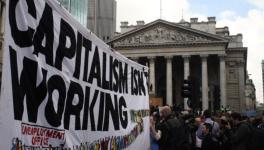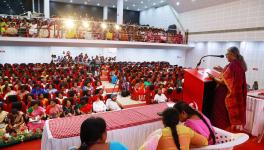Oxfam Report Says India’s Richest 1% Got Richer by 39% in 2018
Image for representational use only; Image Courtesy : Business Insider
Indian billionaires saw their fortunes grow by Rs 22 billion a day in the year 2018, with the top one per cent of the country’s richest getting richer by 39 per cent, while the bottom half of the population saw just per per cent increase in wealth, according to an Oxfam report.
The report, based on data from a number of sources including reports published by UNESCO Institute for Statistics, Credit Suisse, International Monetary Fund, Forbes, and Oxfam itself, was launched on January 21, in Davos, Switzerland, where political and business leaders from all over the world are gathering for the World Economic Forum.
Winnie Byanyima, executive director of Oxfam International, said at the launch, “The size of your bank account should not dictate how many years your children spend in school, or how long you live – yet this is the reality in too many countries across the globe. While corporations and the super-rich enjoy low tax bills, millions of girls are denied a decent education and women are dying for lack of maternity care.”
The report, titled ‘Public Good or Private Wealth?’, reads, “We need to transform our economies to deliver universal health, education and other public services. To make this possible, the richest people and corporations should pay their fair share of tax. This will drive a dramatic reduction in the gap between rich and poor and between women and men.”
Also Read: India’s Education Productivity Has Been Declining: ASER Report
The rich get richer, and the poor get poorer
The report mentions that in the 10 years following the financial crisis that shook the world and caused enormous suffering, the number of billionaires have risen dramatically. The number has increased from 1,125 in 2008 to 2,208 in 2018. According to Oxfam, the wealth of the world’s billionaires increased by 900 billion dollars in 2018 alone.
At the same time, the wealth of the poorest half, consisting of 3.8 billion people, saw a fall in their wealth by 11 per cent. It also stated that between 2017 and 2018, a new billionaire was created every two days, while the poor people kept getting poorer. The wealth became even more concentrated in last one year. In 2017, the 43 richest people owned the same as the poorest half of the world’s population. In 2018, the number decreased to 26.
The report notes that Jeff Bezos, the founder of Amazon, is the richest man in the world, with a fortune of $112bn on the 2018 Forbes list. Just one per cent of his total wealth is the equivalent of almost the whole health budget of Ethiopia, a country of 105 million people.
According to Oxfam, if all the unpaid care work done by women across the globe was carried out by a single company, it would have an annual turnover of $10 trillion – 43 times that of Apple.
Where does India stand?
Talking about healthcare in India, the report states that the highest-quality medical care in the country is only available to those who have the money to pay for it. Even though India is a top destination for medical tourism, the levels of public spending on healthcare are some of the lowest in the world.
The poorest Indian states have infant mortality rates higher than those in sub-Saharan Africa. According to the National Family Health Survey 2015-2016, the mortality rates in Uttar Pradesh and Chhattisgarh were 64 and 54 deaths per 1,000 live births respectively, while the mortality rate in sub-Saharan Africa is 52 per hundred live births.
The report mentions how the caste system continues to affect everyday lives in India. According to it, the life expectancy for a woman belonging to a lower caste is almost 15 years less than that of a woman belonging to an upper caste.
It has also mentioned that prejudicial practices that are propagated by the caste system, like the one where people belonging to the upper castes are not supposed to use the same dishes or utensils as those belonging to the lower castes. However, it says, that there is evidence that the mid-day meal scheme in public schools has contributed to the breaking down of this practice, as positive instances where the children all eat together have been observed.
In recent years, donors like the World Bank have increasingly supported ‘low-cost’ private schooling as an alternative to government provision. However, poverty still remains a decisive factor in exclusion of poor children from private education. According to a study based on Uttar Pradesh, it was found that even low-cost private schools are unaffordable for the poorest 40 per cent of families, and girls and children from lower castes or religious minorities are less likely to attend these.
Oxfam also said that 13.6 crore Indians, who make up the poorest 10 per cent of the country, continued to remain in debt since 2004. It noted, “India's top 10 per cent of the population holds 77.4 per cent of the total national wealth. The contrast is even sharper for the top 1 per cent that holds 51.53 per cent of the national wealth. The bottom 60 per cent, the majority of the population, own merely 4.8 per cent of the national wealth. Wealth of top 9 billionaires is equivalent to the wealth of the bottom 50 per cent of the population.”
Also Read: Just 2% of Top 500 Indian Companies Take Half of Total Profits
Need more taxes for the rich
The report also mentions that the richest, who continue to enjoy booming fortunes, are also enjoying some of the lowest levels of tax in decades, as are the corporations owned by them. According to Oxfam, “[W]ealth is particularly undertaxed. Only 4 cents in every dollar of tax revenue comes from taxes on wealth.”
The report says that in rich countries, the average top rate of income tax fell from 62 per cent in 1970 to 37 per cent in 2013. The average top rate of personal income tax is 28 per cent in developing countries. In some countries like Brazil and UK, the poorest 10 per cent of the population is now paying a higher proportion of their incomes in tax than the richest 10 per cent.
The report says that the government should focus their efforts on raising more from the very wealthy to help fight inequality. It says that getting the richest to pay just 0.5% per cent extra tax on their wealth could help educate all 262 million who are out of school and provide healthcare that would save lives of 3.3 million people. The super-rich are hiding a shocking amount of 7.6 trillion dollars from the tax authorities. The big corporates also hide huge amounts offshore. Together, this deprives the developing countries of 170 billion dollars a year.
Also Read: Crisis of Inequality Gripping India
For a better world
The report has made several recommendations to the governments all over the world, urging them to choose the public good over private wealth. It says, “Today’s levels of inequality and poverty are a choice. We can continue to choose to reward those who are already rich, or we can choose to fight inequality and end poverty.”
The recommendations made by Oxfam are:
1. Deliver universal free health care, education and other public services that also work for women and girls. Stop supporting privatization of public services. Provide pensions, child benefits and other social protection for all. Design all services to ensure they also deliver for women and girls.
2. Free up women's time by easing the millions of unpaid hours they spend every day caring for their families and homes. Let those who do this essential work have a say in budget decisions and make freeing up women’s time a key objective of government spending. Invest in public services including water, electricity and childcare that reduce the time needed to do this unpaid work. Design all public services in a way that works for those with little time to spare.
3. End the under-taxation of rich individuals and corporations. Tax wealth and capital at fairer levels. Stop the race to the bottom on personal income and corporate taxes. Eliminate tax avoidance and evasion by corporates and the super-rich. Agree a new set of global rules and institutions to fundamentally redesign the tax system to make it fair, with developing countries having an equal seat at the tab.
Get the latest reports & analysis with people's perspective on Protests, movements & deep analytical videos, discussions of the current affairs in your Telegram app. Subscribe to NewsClick's Telegram channel & get Real-Time updates on stories, as they get published on our website.
























